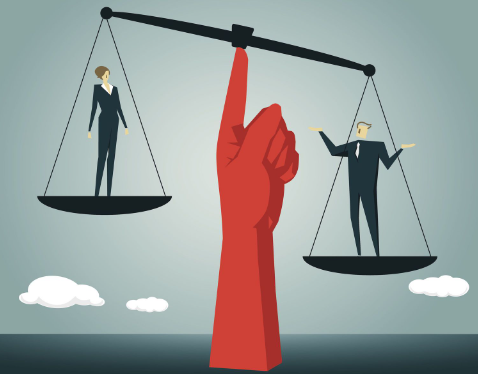INTRODUCTION
As the tricolor flag fluttered in the wind on that historic day of August 15, 1947, a wave of hope surged through the hearts of millions of Indians. The dawn of independence promised liberation from oppressive colonial rule, yet, more than seven decades later, a different kind of tyranny persists – the insidious grip of patriarchy.
Post-independence India continues to grapple with the shadow of this age-old social evil, rendering our hard-fought freedom incomplete and our dreams of true independence unrealized.
A CYCLE OF SUPPRESSION
Patriarchy, like a silent predator, has woven itself into the fabric of our society, dictating lives and destinies with an iron hand. It is a cycle of suppression, where women are held captive by archaic norms and traditions, often suffocated under the weight of societal expectations. These chains might not be tangible, but their effects are painfully real. They manifest in every facet of a woman’s life, from birth to death.
At birth, the wails of a newborn girl echo against the backdrop of gender-based discrimination. The persistent preference for male heirs, a remnant of bygone eras, paints a grim picture of society’s collective mindset. Female infanticide and sex-selective abortions thrive, fuelled by the desire for a son to carry forward the family legacy. This early betrayal of daughters exemplifies how patriarchy still poisons our minds.
EDUCATION AND THE ILLUSION OF EQUALITY

While strides have been made in women’s education, patriarchy still lurks within the corridors of learning institutions. Girls are often denied access to quality education, their aspirations crushed by conservative attitudes. Even those who manage to break through the barriers of discrimination, often find themselves shackled by low expectations and gendered career options. The lingering belief that a woman’s role is primarily domestic continues to stifle her potential and ambition.
THE WORKPLACE BATTLEFIELD
The workplace is another battlefield where the struggle against patriarchy rages. Despite qualifications and capabilities, women find themselves confronting a stubborn glass ceiling showcasing ample discrimination. Unequal pay, limited opportunities for growth, and an atmosphere of gender bias create a hostile environment even after years of independence.
The corporate world remains largely dominated by men, who often hold the reins of power and decision-making. The chasm between the sexes is a constant reminder that true independence is still far from grasp.
VIOLENCE AND FEAR
The horrors of gender-based violence underscore the pervasive nature of patriarchy. Women navigate through life burdened not only by societal expectations and discrimination but also by the constant threat of physical and emotional abuse. Domestic violence, acid attacks, dowry deaths, and sexual harassment are rampant, casting a chilling shadow over the lives of countless women. Fear becomes a constant companion, a stark reminder that true freedom remains elusive.
THE POLITICAL MIRAGE
Political representation is heralded as the hallmark of democracy, yet the corridors of power in India remain heavily skewed in favor of men. Women’s participation in politics, though increasing, is far from equitable.
Patriarchal norms often delegitimize women’s authority and capability to lead. Women are relegated to the fringes of decision-making, their voices often ignored in matters that concern them the most. The promise of an inclusive democracy remains unfulfilled.
BREAKING THE CHAINS
Breaking the chains of patriarchy is not just a matter of policy; it requires a seismic shift in societal attitudes and perceptions. The struggle against this deeply ingrained social evil demands collective action on multiple fronts.
Education for Empathy: A comprehensive overhaul of the education system is necessary to nurture empathy and equality from a young age. Incorporating lessons on gender sensitivity and the detrimental effects of patriarchy can shape young minds to challenge existing norms.
Legal Reforms and Enforcement: While legal measures are in place, they must be fortified with stringent enforcement to end discrimination against women. Justice delayed is justice denied, and a swift response to gender-based crimes can deter potential perpetrators and provide solace to survivors.

Media’s Role: Media and popular culture possess the power to shape societal narratives. Responsible representation of women as strong, independent individuals can challenge traditional stereotypes and pave the way for a more equal society.
Empowering Grassroots Movements: Grassroots movements led by women are catalysts for change. Initiatives like Self Help Groups (SHGs) empower women economically and socially, breaking the cycle of dependency, discrimination and oppression.
Promoting Male Ally-ship: Men must actively participate in dismantling the patriarchy. Championing gender equality, challenging sexist behaviors, and serving as allies can contribute to the dismantling of patriarchal norms.
CONCLUSION
The journey of post-independence India is marred by the enduring grip of patriarchy. The nation’s progress has been overshadowed by the unfulfilled promises of gender equality and true independence. As we celebrate our nation’s achievements, let us also acknowledge the painful reality that countless women continue to endure.
Our struggle for freedom is incomplete as long as patriarchy remains unchallenged. Only through collective action, education, and unyielding determination can we break the chains of oppression, truly liberate our women, and fulfill the dreams of a just, equal, and independent India.
-BHAWINI SRIVASTAVA
MUST READ: MEDIA AND THE EROSION OF THEIR ETHICAL BOUNDARIES IN THE 21ST CENTURY


